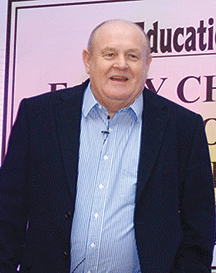 I WOULD LIKE TO BEGIN WITH thanking EducationWorld for the opportunity to share some of my experiences and views relating to early childhood care and education (ECCE), particularly in the UK and other parts of the world. As ECCE practitioners, we are clearly facing times of challenge, but also of opportunity because we can positively affect the early foundational years, and therefore the future, of millions of children around the world.
I WOULD LIKE TO BEGIN WITH thanking EducationWorld for the opportunity to share some of my experiences and views relating to early childhood care and education (ECCE), particularly in the UK and other parts of the world. As ECCE practitioners, we are clearly facing times of challenge, but also of opportunity because we can positively affect the early foundational years, and therefore the future, of millions of children around the world.
I qualified as a teacher and taught physical education and maths in one of the biggest high schools in a relatively tough part of the UK. I then moved into special education and taught children with challenging behaviour, and later to a therapeutic community for intelligent disturbed boys.
When my wife and I decided to start a family, as working parents we recognised our own need for quality ECCE for our children. Therefore mustering up courage and taking a big leap into the dark, two sets of friends and ourselves — all of us teachers — sold our homes, sourced considerable bank debt and committed ourselves to providing this service for our children.
It took us at least four years to realise that grasping basics of the business side of ECCE was vital for us to support a sustainable long-term venture. Simply wishing to do good things and hoping it worked wouldn’t be enough.
Busy Bees — the largest chain of pre-primaries in the UK comprising 214 preschools — is about to celebrate 30 years in ECCE. During these years, we have prospered when the economy was buoyant, been through recessions and depressed housing markets.
Following initial bank funding, we received private equity investment, which forced us to learn how to deal with differing expectations of shareholders. At one time we sold out to an Australian company, which eventually went into receivership with huge debts and we bought the UK business back with the support of the Los Angeles-based Knowledge Universe, which runs the largest number of privately-promoted preschools in the US. With their support, we were able to expand our business through organic growth and acquisitions. We are now the largest early childhood education chain in the UK and I have been fortunate to be involved with Knowledge Universe’s business initiatives in South-east Asia and the US.
The purpose of detailing this history of my many years of experience in ECCE is to highlight that worldwide, early years education has benefitted from the involvement of entrepreneurs and innovative practitioners able to provide outstanding skills and experience to what was a cottage industry. Since then, it has matured into a heavily researched education sector, providing strong early years education foundations to millions of children around the world.
My three decades of experience in early childhood education has convinced me that to create a safer and healthier world, the private sector and government have to work together. Sometimes, when governments can afford it, excessive spending and subsidisation override common sense. Especially in Europe, it is evident that governments cannot afford to provide acceptable quality ECCE, or education generally, without the support of private investment. Therefore it is time for government and private education providers to commit themselves to partnerships which ensure reasonable commercial returns and high social rewards. In this context, it is useful to study the structure of American commercial organisations which plough profits into socially beneficial foundations which fund much needed social enterprises.
For entrepreneurs and professionals in ECCE who are present here in large numbers, the future is exciting, yet also challenging. We are fortunate to already have some models of good practice which can be used as a foundation for further development. Of course we can’t get everything right straightaway. We need to attempt new partnerships and experiment with innovative processes and pedagogies. We must have a vision of the big picture and understand the parts we need to play to achieve our ambition of serving the needs of children, preparing them to prosper in increasingly challenging environments worldwide.
Possibly the biggest challenge is of embracing change. This can be exciting but also daunting. Yet we must change because we cannot educate the world without changing funding models, processes and pedagogies, with large numbers of children in emerging markets demanding more imaginative responses. Hand-held devices must form part of the education delivery system because we cannot build enough bricks-n-mortar schools and train enough teachers using traditional methods. The ability to develop partnerships will probably be our measure of success as ECCE promoters and practitioners, and my aspiration is to witness greater sharing of knowledge in a spirit of willing cooperation.
(John Woodward is founder and group CEO of Busy Bees, UK’s largest preschools chain)